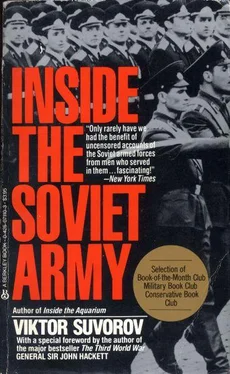Ogarkov's presence in the delegation produced no reaction. The American delegation did not break off the negotiations when he appeared, did not leave the conference hall as a sign of protest, did not slam the door. On the contrary, it was his arrival which got the talks, which had come to a standstill, going again, after which they moved quickly to a triumphant conclusion. Both sides exchanged applause and threw their cards on the table, having agreed on a drawn game.
But, for heaven's sake, if the agreement was shortly going to halt the further growth of anti-missile systems, if the game was almost over, surely this was the moment to take a peep at the enemy's cards? Just as a precaution, against what might happen in the future? What was the point of simply signing the agreement, after which nothing could be put right, without letting a small group from each side catch a brief glimpse of things as they were in the enemy camp? The agreement should not have been signed without some arrangement of this sort.
Or if only, once the agreement had been signed, the Soviets had shown their American opposite numbers something, not a film in a cinema, but something real-in the most general terms, by all means, and without giving any details away. The Soviet delegation, too, would have been not uninterested to see something of the American achievements. But the Soviet card-sharpers knew in advance that the Americans had at least three aces in their hand, and that is why the Soviet side threw their cards on the table, without showing them, and quickly proceeded to shuffle the pack.
Incidentally, shortly after this, having exploited the credulity of America, the Soviet Union built an excellent rocket, with the industrial index number 8-K-84 and the military designation UR-100. UR means `universal rocket'. It can be used both to deliver a nuclear strike and to repel one. It is the largest of the Soviet strategic rockets. Its manufacture is an out-and-out violation of the SALT I agreement, but no protest has come from the American side. This is because Ogarkov's organisation succeeded in concealing the rocket's second function, so that it is officially regarded as a purely offensive weapon. The SALT I agreement was got round in another way, too. An excellent Soviet anti-aircraft rocket, the S-200, which was developed to destroy enemy aircraft, was modernised and made suitable-with certain limitations-for use against enemy missiles. Ogarkov's organisation never allowed this rocket to appear at parades, even in its original, anti-aircraft variant. The Chief Directorate of Strategic Deception is strict in its observance of the principle: `The enemy should see only what Ogarkov wishes to show them. This is the reason why all foreign diplomats were enabled to see the huge construction right in the very outskirts of Moscow.
3
Ever since I first found myself in the West, I have been soaking up information of all kinds. I have visited dozens of libraries, seen hundreds of films. I have taken in everything, indiscriminately-James Bond, Emmanuelle, Dracula, the Emperor Caligula, the Godfather, noble heroes and crafty villains. To someone who had only seen films about the need to fulfil production plans and to build a brighter future, it was impossible even to imagine such variety. I kept on and on going to films. One day I went to an excellent one about the burglary of a diamond warehouse. The thieves broke into the enormous building with great skill, put a dozen alarms out of action, opened enormously thick doors and finally reached the secret innermost room in which the safes stood. Of course, in addition to all the transmitters, alarm devices and so on, there were TV cameras, through which a guard kept constant watch on what was happening in the room where the safes were. But the thieves, too, were ingenious. They had with them a photograph of the room, taken earlier. They put this in front of the cameras and, using it as a screen, emptied the safes. The guards sensed that something was happening. They began to feel vaguely uneasy. But looking at the television screen they were able to convince themselves that everything was quiet in the safe room.
I am sometimes told that the American spy-satellites are keeping a careful watch on what is happening in the Soviet Union. They take infra-red photographs of the country from above and from oblique angles, their photographs are compared, electronic, heat and all other emissions are measured, radio transmissions are intercepted and painstakingly analysed. It is impossible to fool the satellites. When I hear this, I always think of the trio of sympathetic villains who hid from the cameras behind a photograph, using it as a shield behind which to fill their bags with diamonds. Incidentally, the film ended happily for the thieves. When I remember the cheerful smiles they exchanged at the end of their successful operation, I also think of Ogarkov's beaming countenance at the moment the agreement was signed.
The Chief Directorate of Strategic Deception does exactly what the sympathetic trio did-they show the watchful eye of the camera a reassuring picture, behind the shelter of which the gangsters who call themselves the Communist Party of the Soviet Union, the Soviet Army, Military Industry and so forth go about their business.
This is the way it is done in practice. A huge American computer, which has been installed at the Central Command Post of the Chief Directorate of Strategic Deception, maintains a constant record of all intelligence-gathering satellites and orbiting space stations and of their trajectories. Extremely precise short — and long-term forecasts are prepared of the times at which the satellites will pass over various areas of the Soviet Union and over all the other territories and sea areas in which the Armed Services of the USSR are active. Each Chief Directorate unit serving with a military district, a group of armies or a fleet makes use of data provided by this same American computer to carry out similar work for its own force and area. Each army, division and regiment receives constantly up-dated schedules showing the precise times at which enemy reconnaissance satellites will overfly their area, with details of the type of satellite concerned (photo-reconnaissance, signals intelligence, all-purpose, etc.), and the track it will follow. Neither the soldiers nor most of the officers know the precise reason for daily orders, like `From 12.20 to 12.55 all radio transmissions are to cease and all radars are to be switched off', but they must obey them. At the same time, each division has several radio transmitters and radars which work only during this period and which are there solely to provide signals for the enemy's satellites.
The Chief Directorate has its own intelligence-gathering satellites, but, unlike those working for the Chief Intelligence Directorate, they maintain a watch over Soviet territory, looking constantly for radio transmitters and radars which fail to observe the timetables laid down for communication security. Severe punishments await divisional or regimental commanders who are found to be ignoring the timetables.
In addition to these bogus signals, the Chief Directorate is constantly organising nights by aircraft, tests of rockets, troop movements and other operations to take place as the satellites' cameras pass overhead, with the aim of emphasising one aspect of activity while concealing others. Thus, in the period running up to the SALT I negotiations, every sort of attempt was made to present a picture of Soviet activity and success in anti-missile operations. After the negotiations, great pains were taken to hide activity and successes in this field, since these represented a violation of the agreements which had been reached. The Chief Directorate differs from our resourceful burglars in presenting false pictures not for a few hours but for decades. It has at its disposal not three crooks but tens of thousands of highly-qualified specialists and almost unlimited powers in its dealings with generals, marshals and those who run the military industries over the concealment of the true state of affairs.
Читать дальше












